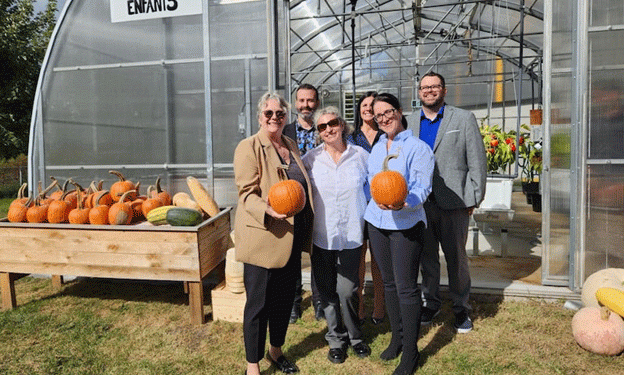The idea of sustainable, local food production has gained significant traction in recent years, especially as global food security becomes an increasingly pressing issue. In Cap-de-la-Madeleine, a community-driven greenhouse project is making waves by producing fruit and vegetables all year long. The solidarity greenhouse, which has been operational since April, is a collaborative effort between local citizens, volunteers, and students from the Dollard Primary School. Led by Café Le Bucafin, the initiative is more than just a source of food—it is a transformative model for community involvement and education.
Impact on Food Security and Community Education
Food security has become a critical concern in many parts of the world, including urban and rural regions of Canada. According to recent studies by the Food and Agriculture Organization (FAO), community-based initiatives like the Cap-de-la-Madeleine greenhouse play a crucial role in increasing access to fresh, locally produced food. This greenhouse has produced 500 kilograms of vegetables, including carrots, cucumbers, tomatoes, and beans, over the past few months. For the residents of the Bas-du-Cap neighborhood, this abundance means access to healthy, high-quality produce, which might otherwise be difficult to afford or find.
Cecilia Protz, the director of Café Le Bucafin and the visionary behind the project, notes that the primary goal of the greenhouse is to make fruits and vegetables available to everyone in the community. “It’s also a food security project for the neighborhood and an educational project for the school,” she proudly states. By involving students from Dollard Primary School, the project integrates agricultural education into the lives of young learners, offering hands-on experience with food production while fostering awareness of sustainability. This educational element is crucial, as it instills an early understanding of the importance of agriculture and food security, preparing future generations to address these issues.
The Economics of a Solidarity Greenhouse
The greenhouse project, which cost $341,032 to establish, was an ambitious endeavor. “The beginning of a greenhouse is expensive because of the infrastructure, as this is a professional-grade facility, but after that, it becomes very profitable because it produces all the time,” explains Protz. The idea of investing in greenhouse infrastructure is gaining momentum worldwide due to the ability of these structures to produce continuously, regardless of weather conditions or seasonality. Greenhouses are known to increase yields by up to 30%, compared to traditional farming methods, while using less land and water.
Solidarity greenhouses, like the one in Cap-de-la-Madeleine, offer a cost-effective solution for community-level food production, especially in areas with long winters or less arable land. The concept of year-round production helps reduce reliance on imported goods, supports local economies, and minimizes the carbon footprint associated with long-distance food transportation.
A Dream Realized Amid Challenges
Cecilia Protz’s dream of creating this greenhouse took several years and was further delayed by the COVID-19 pandemic. However, the long-term benefits of the project are clear. The greenhouse not only provides fresh food but also creates a shared space where community members can come together, learn, and take pride in contributing to their local food system.
The importance of local, sustainable food production has never been more evident. As climate change continues to disrupt global food chains, projects like the solidarity greenhouse in Cap-de-la-Madeleine stand out as solutions that address both food security and environmental sustainability. According to the Canadian Agricultural Partnership, localized food production will play a key role in ensuring long-term food security across the country.
The solidarity greenhouse in Cap-de-la-Madeleine is a shining example of what can be achieved when communities come together to address food insecurity. Beyond the 500 kilograms of vegetables harvested, the project has cultivated a sense of solidarity, environmental consciousness, and education. The success of the initiative highlights the power of localized agricultural projects in building resilient food systems. As more communities embrace similar models, the future of sustainable agriculture looks promising.









